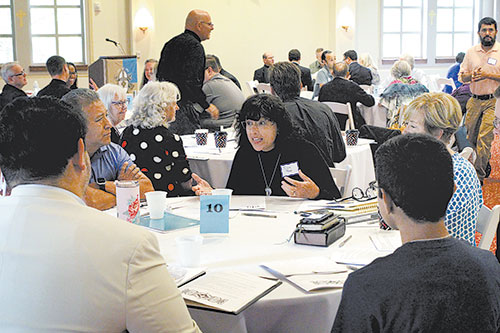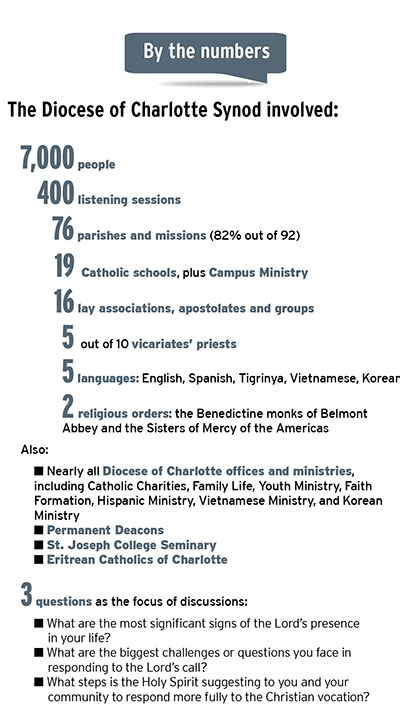 Representatives from parishes, schools, ministries and more gathered June 11 for the closing session of the diocesan Synod in Charlotte at St. Patrick Cathedral’s Family Life Center. (SueAnn Howell | Catholic News Herald)CHARLOTTE — With 7,000 people engaged, 400 listening sessions, and 76 parishes plus many more ministries and groups involved, the Diocese of Charlotte published one report on the sentiments shared and gleaned during its local synod, which began last fall after a worldwide invitation from Pope Francis.
Representatives from parishes, schools, ministries and more gathered June 11 for the closing session of the diocesan Synod in Charlotte at St. Patrick Cathedral’s Family Life Center. (SueAnn Howell | Catholic News Herald)CHARLOTTE — With 7,000 people engaged, 400 listening sessions, and 76 parishes plus many more ministries and groups involved, the Diocese of Charlotte published one report on the sentiments shared and gleaned during its local synod, which began last fall after a worldwide invitation from Pope Francis.
On June 30, the diocese submitted its synod report to the U.S. Conference of Catholic Bishops, which now will synthesize reports from dioceses around the country, then share its findings with the Vatican. Read the full report.
Catholics from across western North Carolina participated the Diocese of Charlotte’s synod, to prayerfully listen to the Holy Spirit and to one another through conversations on the theme “For a Synodal Church: Communion, Participation, and Mission.”
The goal of the worldwide Synod: to listen and consult with the People of God about envisioning the future of the Church.
Bishop Peter Jugis said during a closing session in June he will study, digest and meditate on the testimonies and needs that emerged during the synod, to add to his understanding “another dimension of my awareness of the diocese’s needs” and provide “good input for my ministry.”
Dr. Alessandro Rovati, a Belmont Abbey College professor who facilitated the diocesan synod, wrote the diocese’s final report. He called the synod a beginning, not an end.
“It is remarkable that 7,000 people engaged in the process,” he said, “because it is a sign that so many who have a desire to grow in their faith, to participate more fully in the life of the Church, and to entrust to their community and the broader Church their joys and concerns.”
Among highlights that emerged, Dr. Rovati said:
The synod was an occasion to see with clarity the many ways the Lord remains present and faithful to His people.
- Participants lamented they are often distracted, and the awareness of Christ’s presence often is not the leading force in their lives.
- Participants reflected on elements of contemporary society that are especially difficult to deal with.
- There’s a need to get past barriers of language, race and culture to deepen the sense of communion in our parishes.
- There are profound divisions caused by the polarization and disunity within the Church over some of its teachings and how to embody them in society. The synod showed that we frequently let such internal divisions and disagreements completely take over our imagination and way of being together.
- Issues that appear to cause strife involve the Church’s public witness on abortion, homosexuality and gender issues, the role of women in the Church, and the legacy of Vatican II in matters of liturgy and in the Church’s life.
- Pope Francis has clearly stated that synodality does not involve changing “traditional truths of Christian doctrine.” Instead, internal disagreements about what the Church teaches are an invitation to examine our conscience, grow in our understanding of what the Lord calls us to, and more fully embody Christ’s commandments.
The diocese’s synod ran from last October 2021 to June 2022 and included parishioners, ministries, schools, lay associations and groups, religious orders and others. Dr. Rovati stressed that while work remains to ultimately embody the vision of the synod, “the diocesan synodal journey was profoundly moving and beautiful.”
It was particularly moving, he said, “to see how fruitful it is to listen to the testimonies of the ways the Lord is at work in our lives and the lives of our communities and to the questions and challenges that people face. The Lord is calling us through all these things, asking us to take a step in our Christian vocation.”
— Catholic News Herald
More online
At www.charlottediocese.org/synod2023: Learn more and watch Dr. Rovati’s keynote address from the final listening session of the diocesan Synod


